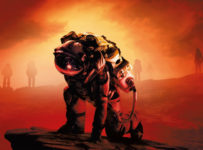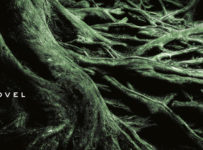
When you read a Discworld book, you read it on two levels: its worth in the overall Discworld canon and its worth as a single cohesive novel. When I started my undertaking of rereading the entire Discworld set a few years ago (I got caught up on The Last Hero for a while despite the fact that it is literally a less than two hour read), the only Discworld novel I hadn’t read was Wintersmith. Since then, Unseen Academicals and I Shall Wear Midnight have joined that shameful list. When I read Wintersmith, I felt great shame. That I had yet to read Unseen Academicals until today is not so much a cause for shame as one for sadness.
Ponder Stibbons discovers that, in order for Unseen University to maintain its food budget, they have to field a foot-the-ball team (or football). Coincidentally, the Patrician wants to make football less of a blood sport and something altogether more civilised.
Caught up in the football ruckus are four entirely new characters working in the downstairs of UU: Glenda and Juliet, kitchen workers, and Trev and Nutt – candle dribblers, one of whom is rather goblin-like.
While the Tiffany Aching series has become a vital part of Discworld folkloric canon, Unseen Academicals returns us to the beating heart of the Disc, Ankh-Morpork. While the story shows the promise of becoming another examination of mania along the lines of Moving Pictures or Soul Music, Pratchett never amps it up to that level. Rather than covering a season of an exciting new (old) sport, Pratchett builds up for one big game. There are hints that there is some sort of religious force trying to make its place known as in the aforementioned titles, but nothing much ever comes of it – and what does is ill explained. What is Unseen Academicals but politics?
It’s a character study, of the sort of characters that Pratchett doesn’t often trot out.
The most obvious stand out character is Nutt, the somewhat goblinesque candle dribbler who doesn't speak to many people. His character growth through exposure to humans is admirable, as are the varied relationships that he develops with them. Pratchett has a sense of love for Nutt that translates well onto the page, but the styling of the character is such that he cannot be more than a one-shot. He can be alluded to, or cameo, but I don't think that he could carry another book. His character arc is complete in a way that someone like Vimes', Vetinari's or Granny Weatherwax's will never be.
More abnormal is Trevor Likely, Nutt's boss and best and only friend, and I felt something from this character that I don’t often feel from Pratchett. Trevor seems human and natural, like Vimes would like to believe he is. "If you’re not a cop [or a wizard or witch], you’re little people”.
Rather than the simple Ankh-Morpork morass of the wandering audience, we are finally allowed into the mind of one of the “little people”. There is nothing special about Trevor except that his father played football and was killed by it. This, in the context of Discworld, makes him special. This point of difference makes him a more interesting character than if there was something "unusual†about him. Trev is one of the most "real†feeling characters in recent Discworld history, and I'd happily read many more books about him than I would, say, Moist von Lipwig. The nature of the beast is that he can never really be more than ancillary after this, as I doubt that another Discworld book with football as its central tenet will ever be needed.
Of course, we get a vision of the man on the street, but narratively this book does not exactly jive with the 36 books that came before it: we are presented with the idea that football has been a consistent love of Ankh-Morpork’s lower classes for hundreds of years and that the Watch tends to turn a blind eye. Discounting entirely that the Ankh-Morpork presented in The Colour of Magic and The Light Fantastic is wholly prototypical and bears no resemblance to the Ankh-Morpork of “today” (or roughly that of Equal Rites on), that people feel so strongly for their teams and have colour and locality rumbles is something that you might have expected to come up before now. The idea of Ankh-Morpork as a mob does not work so well when you have the idea that it’s a mob divided by petty loyalties (albeit mobs that avoid the eyes of the Watch), and it’s strange that it took so long to reach this point.
Still, continuity jostling aside, this is a satisfying book. It's not about the story, which is a lot of manoeuvring towards nothing in particular and features a more than usually verbose Patrician and a go-nowhere “birth of a supermodel” subplot, but about two men (of sorts), a cook, the idea of a woman, and the pursuit of personal worth.
Does Unseen Academicals have worth? Yes, it does, but not in story so much as in character.


